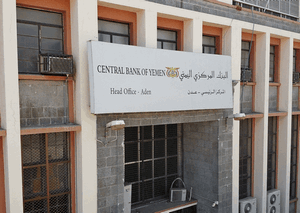Exclusive: The Central Bank of Yemen Aims to Enhance the Role of Banks in the National Economy
The Central Bank of Yemen in cooperation with the International Monetary Fund and the US Agency for International Development has issued a number of legislations and rules. These legislations and rules have been issued as a part of the Central Bank efforts to reform and strengthen the role of the official banking system in the Republic of Yemen, raise the strength of the current working banks, encourage the establishment of new banks in accordance with transparent and governance standards which would enable the establishment of banks with strong financial and administrative integrity in consistent with international requirements related to the compliance with money-laundering and terrorism facing standards. They have been also issued for the safety of the funds invested in banks so that they represent a real addition to the Yemeni banking sector, to restore the role of the banks as essential partners for development, and to link the Yemeni economy with the international economy.
These legislations and rules are represented in the following:
Board of Directors Resolution No. (7/2/2022) for the year 2022 regarding the forming of Licensing Committee.
Board of Directors Resolution No. (10/2/2022) for the year 2022 was also issued regarding the granting of licenses to banks and the practice of banking.
Board of Directors Resolution No. (11/2/2022) for the year 2022 regarding the amendment of some articles of Resolution No. (12) issued in 2010 regarding the implementing regulation of Microfinance Banks Law No. (15) issued in 2009.
Board of Directors Resolution No. (8/2/2022) for the year 2022 regarding raising the capital of the banks operating in the Republic of Yemen.
The texts of Articles
Article (1): The minimum paid-up capital for each bank licensed to operate in the Republic of Yemen, including branches of foreign banks, shall be (45,000,000,000) rials (forty-five billion Yemeni rials).
Article (2): The minimum paid-up capital for each Microfinance Bank licensed to operate in the Republic shall be (5,000,000,000) rials (five billion Yemeni rials).
Article (3): All operating and licensed banks upon the issuance of this resolution must reconcile their affairs in accordance with the provisions of this resolution to meet the minimum capital within a maximum period of five years starting from the date of its implementation. Each bank must meet a minimum of (20%) from the annually required increase until the end of the fulfilment period of January 31, 2027.
Article (4): Licensed banks have the rights to use their cash reserves to meet the minimum capital referred to in Articles (1,2) of this resolution, after obtaining a prior written approval from the Central Bank.
Article (5): In case of ending the first year of the specified period and it becomes evident that any bank is unable to fulfill the requirements of this resolution, the Central Bank shall consider the necessary procedures for that bank to fulfill the requirements of this resolution.
Article (6): No bank will be granted or can retain a license if it doesn’t meet the minimum capital stipulated in Articles (1,2) of this resolution. The concerned bank is subjected to withdrawal of the license and liquidation after the end of the specified period in the case of its inability to meet commitments.
Adjustment of the legal reserve ratio
The Board of Directors Resolution No. (9/2/2022) for the year 2022 regarding amending the ratio of the legal reserve that banks must detain from annual profits was also issued.
Article (1) stipulates that the percentage of the legal reserve that banks must detain out of the annual profits shall not be less than (25%) (twenty-five percent) of the their net profit after approving the amounts required for taxes and other contingent liabilities. The percentage shall be detained before distributing profits or any shares thereof or transferring them to their headquarters abroad in the case of branches of foreign banks.
Article (2): All traditional and Islamic banks must annually maintain a legal reserve balance of no less than the percentage mentioned in Article (1) of this resolution until the legal reserve balance equals twice the paid-up or allocated capital for work in the Republic as the case may be for traditional banks. And until the legal reserve equals the paid-up capital or allocated to work in the Republic, as the case may be for Islamic banks.
Regulating transaction in foreign exchange
As a part of strengthening and reinforcing the regulatory framework for the exchange sector, complementing the procedures aimed at addressing the imbalances and deficiencies in practicing and regulating the foreign exchange market, the Central Bank issued a circular addressed to exchange companies and facilities on March 23, 2022.
The circular included a number of regulations that obligating exchange companies and facilities to provide their financial services in accordance with the service application forms that contain all details of financial transaction and signed by the customer. This is to confirm the correct financial practice, and to prevent illegal means that some may use through carrying out financial transaction for customers based on messages over social media or cell phones calls.
Due diligence procedures
The circular also specified the procedures to be followed while executing foreign exchange transactions and remittances, which exceed two million Yemeni rials or its equivalent in other foreign currencies. This is implemented through due diligence procedures to ID the customer and the true beneficiary owner and verify both of through the minimum amount of required data and information. Moreover, it is not allowed to carry out any banking transaction that do not meet the specified requirements, depending on due diligence procedures to identify agents and remittances senders.
The circular dealt with the obligation to follow the requirements of registration and the regulatory of automated accounting records, in a manner that ensures the presenting of data and reports that reflect the reality of the activity and not to follow the methods that lead to concealing the nature of operations and the provision of misleading data and reports. It also dealt with the obligation to display the prices of buying and selling foreign currencies to the public through electronic display boards in a prominent area at the place of business.
Import coverage controls
Commitment when selling foreign currency exchange to customers for the purpose of covering the commercial needs of imports from abroad to complete all data, documentary attachments and documents supporting the import process. Those data, supporting documents, the reality of the customer’s activity and details of operations required foreign exchange amount to be covered will be verified.
Commitment to the requirements for the maintaining of regular automated accounting. So that all foreign exchange transactions are recorded at the level of each transaction as it occurs. This must be done through the entry windows designated for them in the system in line with the nature of the process which leads to its being shown in the relevant reports. Furthermore, commitment not to use any methods or mechanisms for registration that leads to concealing the true nature of the operations result in presentation of data and reports in a misleading manner to the Central Bank. Moreover, commitment to refrain from maintenance or forming long foreign currencies positions (assets of foreign currencies exceed liabilities of them) and you must sell your foreign currency surplus at the prevailing market exchange rate.
Inspection teams
The Central Bank circular prevented the exchange companies and facilities from providing their financial services via mobile phones, forming long positions in foreign currencies, and keeping foreign currency assets in excess of their obligation.
The circular also prohibited carrying out any foreign currencies sale and purchase or other operations in the company or facility through the personal accounts of partners and owners, or the continuation of operations after ten o’clock p.m. every working day, and there must be commitment to the regulatory controls related to the closing and opening price for each working day.
The Central Bank through the field inspection teams of the exchange sector will verify compliance and take the legal procedures against violators of the regulatory rules of the exchange market.
The Governor meets the Saudi Ambassador
The Governor of the Central Bank of Yemen, Mr. Ahmed Ahmed Ghaleb, met this evening, Wednesday March, 9, 2022 the ambassador of Saudi Arabia to the Republic of Yemen Mr. Muhammed Al Jaber, along with the head of Saudi Programme for the Development and Reconstruction of Yemen. The meeting, which took place at the headquarter of the Programme in Saudi Capital Riyadh, discussed the economic situation in Yemen in light of the existing challenges and the difficult conditions left by the ongoing war and casts a shadow on the overall situation. The most important topic discussed was the economic situation, in addition to repercussions caused by the Ukraine crisis and its consequences of the negative effects on the economic situation in the Republic of Yemen.
During the meeting, they reviewed aspects of support provided and will be provided by the Kingdom of Saudi Arabia to enhance economic stability in Yemen, supporting the local currency, improving services provided to criticizes, as well as coordinating joint efforts between the Central Bank of Yemen, and central banks of and financial institutions in Gulf Cooperation Council (GCC) system.
On his part, Mr. Ghaleb valued the vital role played by the Kingdom of Saudi Arabia in supporting the Yemeni government and people in all fields. At the same time, he expressed his aspiration to expand and strengthen this support to enable Yemen to overcome the existing challenges and overcome this difficult stage it is going through, which we are accustomed to from the brothers in the Kingdom of Saudi Arabia in all exceptional stages that Yemen has gone through.
The meeting was attended by Mansour Rajeh, Deputy of Banking Supervision, from the Yemeni side, and by Hasan Alattas and Mazen Aba Alkhail from the side of the Saudi Program for the Development and Reconstruction of Yemen.
Activating branches
The Governor of the Central Bank of Yemen, Mr. Ahmed Ghaleb, has met the directors of the Central Bank branches in the liberated governorates at the Central Bank building (the head office, Aden).
In this meeting, they reviewed activities of the branches, the level of performance in them, and how to improve their work to implement the laws, regulations and instructions of the Central Bank, which regulate the work of the banking sector and exchange companies located within the scope of the work of those branches.
The Governor of the Central Bank, his deputy and the attendees listened to the performance reports of each branch, the obstacles they face, and the branches work plans during 2022.
In this meeting, the attendees discussed the performance of the branches frankly and transparently. Then it was agreed to benefit from the experiences of the successful branches and generalize them to the other ones.
Furthermore, many decisions and directives were taken to address some of the shortcomings in some branches in order to help activating the work, especially the office and field supervisory work aimed at implementing and activating the newly issued regulations and instructions.
The meeting was attended by Dr. Muhammed Omar Banajah, Deputy Governor of the Central Bank, a number of bank agents, general managers and relevant specialists.
Jordanian company for financial evaluation
The Deputy Governor of the Central Bank of Yemen, Dr. Muhammed Omar Banajah, at the headquarter in Aden, held a meeting with the supervisory committee of financial evaluation project funded by the World Bank and implemented by BDO Jordan (Alsamman ad his Partners), the leading company in the field of financial control and auditing. The meeting was held to discuss the activities and arrangements that have been completed during the previous period.
Earlier, the Governor of the Central bank, Mr. Ahmed Ghaleb, has issued a decision to form the Supervisory Committee headed by the Deputy Governor, Dr. Muhammed Omar Banajah and the membership of the agents of the various sectors of the bank, in addition to a number of general managers of the relevant departments.
ومن المقرر أن يقوم فريق من شركة BDO الأردنية بزيارة ميدانية إلى عدن خلال الفترة المقبلة تهدف إلى متابعة العمل على المحاور الستة الرئيسية للمشروع عن كثب وعلى أرض الواقع. @أعلن البنك المركزي اليمني عن فتح مزاد لبيع عشرين مليون دولار أمريكي (20،000،000 دولار أمريكي) في 24 مارس 2022. وتجدر الإشارة إلى أن مزاد العملات الأجنبية سيستمر أسبوعيًا.






